Demonstrative Video
Problem 1
- Calculate the charge stored in a 3 pF capacitor with 20 V across it. Also determine the energy stored in the capacitor.
Solution 1
-
Charge:
\[ Q = C \cdot V = 3\times 10^{-12} \times 20 = 60~\mathrm{pC} \]
-
Energy:
\[ W = \frac{1}{2} C \cdot V^2 = \frac{1}{2} \times 3\times 10^{-12} \times 400 = 600~\mathrm{pJ} \]
Problem 2
- The voltage across a 5 \(\mu\)F capacitor is \(v(t) = 10\cos 6000t\) V. Calculate the current through it.
Solution 2
-
Current:
\[ i(t) = C \frac{dv}{dt} = 5 \times 10^{-6} \cdot \frac{d}{dt}(10 \cos 6000t) = -0.3 \sin 6000t~\mathrm{A} \]
Problem-3
Determine the voltage across a 2 \(\mu\)F capacitor if the current through it is \(i(t)= 6e^{-3000t}\) mA. Assume that the initial capacitor voltage is zero.
.
Solution-3
Problem-4
Determine the current through a 200 \(\mu\)F capacitor whose voltage is shown below
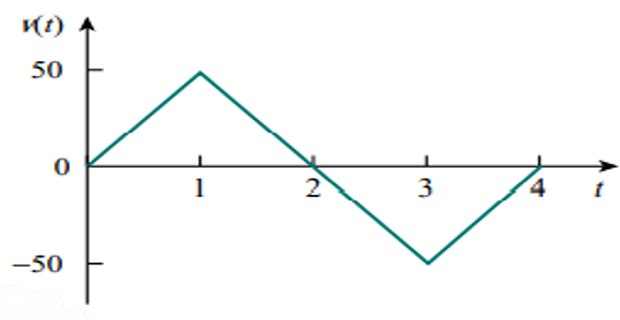
image
Solution-4
The voltage waveform

Problem-5
Obtain the energy stored in each capacitor under the dc condition:
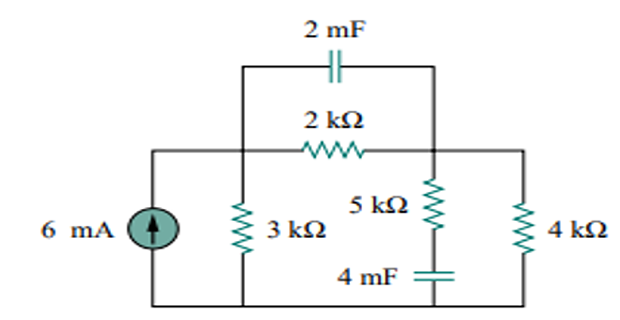
image
Solution-5
Under dc condition, replace each capacitor with OC.
- resistors and The current through the series combination of the\[\begin{aligned} i = \dfrac{3}{3+2+4}(6~\mathrm{mA}) = 2~\mathrm{mA} \end{aligned}\]
Voltages across the capacitors:
\[\begin{aligned} v_1 & = 2000i = 4~V \qquad v_2 = 4000i = 8~V \end{aligned}\]Energy stored:
\[\begin{aligned} &w_{1}=\frac{1}{2} C_{1} v_{1}^{2}=\frac{1}{2}\left(2 \times 10^{-3}\right)(4)^{2}=16 \mathrm{~mJ} \\ &w_{2}=\frac{1}{2} C_{2} v_{2}^{2}=\frac{1}{2}\left(4 \times 10^{-3}\right)(8)^{2}=128 \mathrm{~mJ} \end{aligned}\]
Problem-6
Find the equivalent capacitance between the terminals:
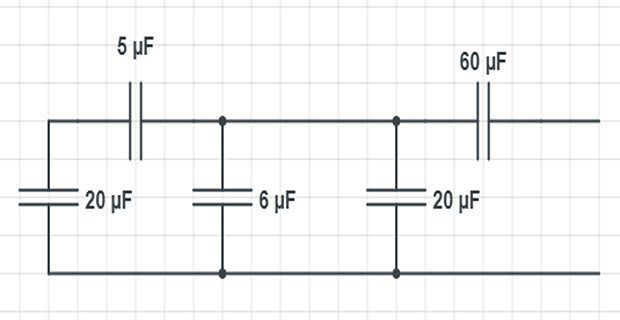
image
Solution-6
- and Equivalent capacitance of series capacitors\[\frac{20 \times 5}{20+5}=4 \mu \mathrm{F}\]
- and 20- capacitor is in parallel with the 6- This 4-\[4+6+20=30 \mu \mathrm{F}\]
This \(30-\mu \mathrm{F}\) capacitor is in series with the \(60-\mu \mathrm{F}\) capacitor.
- Hence, the equivalent capacitance for the entire circuit is\[C_{\mathrm{eq}}=\frac{30 \times 60}{30+60}=20 \mu \mathrm{F}\]
Problem-7
Find the voltage across each capacitors:
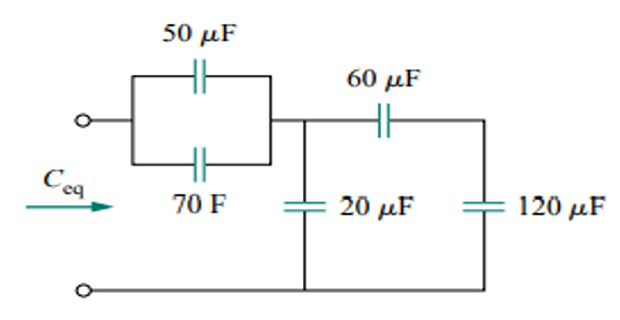
image
Solution-7
We first find the equivalent capacitance \(C_{\mathrm{eq}}\).
The two parallel capacitors can be combined to get \(40+20=60 \mathrm{mF}\).
- and is in series with the This\[C_{\mathrm{eq}}=\frac{1}{\frac{1}{60}+\frac{1}{30}+\frac{1}{20}} \mathrm{mF}=10 \mathrm{mF}\]
The total charge is \(q=C_{\mathrm{eq}} v=10 \times 10^{-3} \times 30=0.3 \mathrm{C}\)
- source. Therefore, and 30 -mF capacitors, because they are in series with the This is the charge on the\[v_{1}=\frac{q}{C_{1}}=\frac{0.3}{20 \times 10^{-3}}=15 \mathrm{~V} \quad v_{2}=\frac{q}{C_{2}}=\frac{0.3}{30 \times 10^{-3}}=10 \mathrm{~V}\]
- Finally \[\begin{aligned} \text{KVL}~&v_{3}=30-v_{1}-v_{2}=5 \mathrm{~V} \\ \text{or}~&v_{3}=\frac{q}{60 \mathrm{mF}}=\frac{0.3}{60 \times 10^{-3}}=5 \mathrm{~V} \end{aligned}\]
Problem-8
Assuming the capacitors are initially uncharged, find \(v_0\)
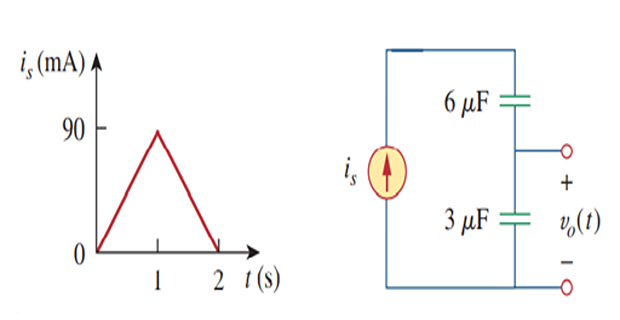
image
Solution-8
For
\(1<\mathrm{t}<2, \mathrm{i}=(180-90 \mathrm{t}) \mathrm{mA}\),Problem-9
If \(v_0=0\), find \(v(t),~i_1(t) ~\text{and}~ i_2(t)\)
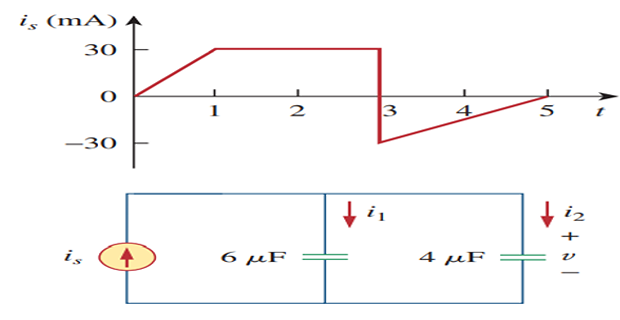
Solution-9
For
\(0<\mathrm{t}<1\),For
\(3<t<5\),\(v(t)=\left[\begin{array}{lc}1.5 t^{2} k V, & 0<t<1 s \\ {[3 t-1.5] k V,} & 1<t<3 s \\ {\left[0.75 t^{2}-7.5 t+23.251 k V,\right.} & 3<t<5 s\end{array}\right.\)
\(i_{1}=C_{1} \frac{d v}{d t}=6 \times
10^{-6} \frac{d v}{d t} \\
i_{1}=\left[\begin{array}{ll}18 t~\mathrm{mA}, & 0<t<1 s
\\ 18~\mathrm{mA}, & 1<t<3 s \\ {[9 t-45] ~\mathrm{mA},} &
3<t<5 s\end{array}\right.\)
\(i_{2}=C_{2} \frac{d v}{d t}=4 \times 10^{-6}
\frac{d v}{d t} \\ i_{2}=\left[\begin{array}{lc}12 t~\mathrm{mA},
& 0<t<1 s \\ 12 ~\mathrm{mA}, & 1<t<3 s \\ {[6 t-30]
~\mathrm{mA},} & 3<t<5 s\end{array}\right.\)